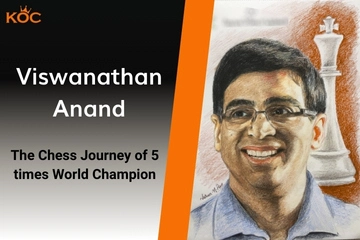Viswanathan Anand, affectionately referred to as “Vishy” Anand, is a name that resonates with every Indian chess player. Being the first Indian to become a chess Grandmaster, his contribution to the game goes much beyond trophies and titles. Anand is not just a FIDE World Champion and speed chess master but also a national hero who sparked a chess revolution in India.
This article explores the life, success, playing style, and legacy of the Indian chess champion who placed India on the world chess map. For those looking for a Viswanathan Anand chess biography, this is your complete guide.
Early Life and Becoming a Grandmaster at Age 18
Viswanathan Anand was born in Chennai, Tamil Nadu, on December 11, 1969. Growing up in a liberal and intellectually inclined family, Anand was brought up on chess at the tender age of six by his mother Susheela, who played regularly herself. Anand’s incisive mind and instinctive aptitude for the game became apparent quite early, and he started taking serious competition as a pre-teen.
He quickly rose through the national ranks, and by the time he was 15, he had already won the Asian Junior Championship. In 1987, he won the World Junior Chess Championship, a victory that made international chess circles take notice. A year later, in 1988, at just 18 years old, Viswanathan Anand became India’s first Grandmaster—marking a historic moment in Indian chess.
It was not only his ability that differentiated him but his unique playing style—characterized by speed, transparency, and instinct. Unlike the conservative, elongated styles of his peers, Anand’s moves were swift and focused, for which he became known as a speed chess master.
Famous Matches and Rivalries
Throughout his rich career, Anand has been up against and beaten some of the world’s greatest chess legends. One of his most memorable rivalries was Anand vs Kasparov. Their first encounter took place at the 1995 PCA World Chess Championship in New York. While Kasparov ultimately secured the title, Anand gained recognition for his bold opening strategies and initial lead.
Another recallable rivalry was between Anand vs Kramnik, particularly during the 2008 World Chess Championship match, where Anand won in defending his title. He showed exquisite opening preparation and flexibility, catching Kramnik off guard.
Anand had to play Veselin Topalov in a World Championship match in Bulgaria in 2010. Despite tough traveling conditions because of an eruption in Iceland, Anand stood his ground and came out on top after a hard-fought 12-game encounter.
In 2013 and 2014, the world also saw the shifting of the crown from Anand to Magnus Carlsen. Though Anand did lose both matches for the World Championship, his sportsmanship, as well as his capacity to fight at the same level as one much younger, gained hearts around the globe.
Anand’s Playing Style: Intuition, Speed, and Adaptability
Anand is most renowned for his intuitive and quick approach to the game. Early in his life, he was usually dubbed the “Lightning Kid” due to his ability to play powerful moves at lightning speed. This rendered him a great asset in speed games such as rapid and blitz chess.
But Anand is not only a speed chess champion. He is also renowned for his profound preparation and flexibility in various forms of the game. His opening preparation, particularly with 1.e4 and 1.d4 systems, has been thoroughly analyzed by players of all levels. In rapid, blitz, or classical forms, Anand has consistently had a balance of aggression and serenity—an element that characterizes the best in the sport.
Impact on Indian Chess
Viswanathan Anand’s success ignited an unprecedented chess boom in India. Before he rose to fame, chess was a niche sport in India. But after he became a Grandmaster and World Champion, hundreds of young Indians were inspired to play the game seriously.
Now, India has more than 80 Grandmasters, most of whom attribute their role model to Anand. Young sensations such as D. Gukesh, R. Praggnanandhaa, and Arjun Erigaisi are commonly known as the torchbearers of Anand’s legacy. The culture of chess in cities such as Chennai, Hyderabad, and Bangalore has flourished, with numerous players gaining international recognition.
The need for quality training has also increased, and institutions have come up to become the best chess academy in India, providing world-class coaching and international exposure to the future generation of Indian chess champions. For Karnataka students, chess classes in Bangalore are gaining popularity, partly due to the Anand effect.
Legacy and Contribution to Chess Education
Anand’s influence is not limited to competitive play. He has actively contributed to chess education through books, online commentaries, and training programs. His autobiographical work, Mind Master, offers deep insights into his career and approach to the game. He has also mentored emerging talents and served as an ambassador for Indian chess on various global platforms.
In recognition of his service, Anand has received the Padma Vibhushan, India’s second-highest civilian honour, among several other accolades. These Vishwanathan Anand achievements reflect his impact not only as a player but also as a teacher and ambassador of the sport. He remains an active figure in FIDE and other global chess institutions, pushing for the sport’s growth from the grassroots to professional levels.
What Players Can Learn From Anand
Viswanathan Anand’s career is a lesson in steadiness, preparation, and poise under pressure. One of the most important lessons that budding players can take from him is the need to remain calm in tricky situations. The ability of Anand to remain calm even in extremely stressful championship matches is the stuff of legend.
Another lesson is his work ethic in preparation. At the age of 40 and 50, Anand learned new technologies, employed computer engines, and read widely—demonstrating that learning is never finished in chess. Last but not least, his humility and sportsmanship make him a role model for not only how to win, but how to lose graciously and return stronger.
Final Thoughts
From his early days as a boy learning chess in Chennai to being a FIDE World Champion and an international ambassador for the game, Viswanathan Anand chess biography is a remarkable story of genius, strength, and inspiration. His battles with legends Kasparov and Carlsen, his natural playing style, and his ongoing contributions to Indian education through chess guarantee that his legacy shall be remembered for generations.
If you’re inspired to begin your own chess journey, consider starting with structured training. Kingdom of Chess is one such academy offering expert coaching for all levels. Whether you’re a parent looking for chess classes in Bangalore or a student dreaming of becoming a Grandmaster, Anand’s life reminds us that greatness is always within reach—with the right guidance and relentless effort.



